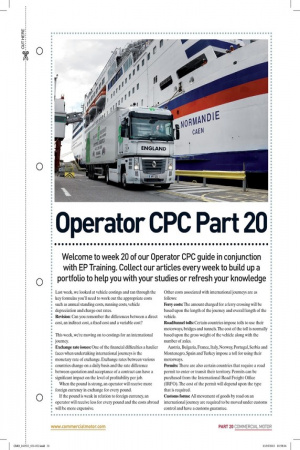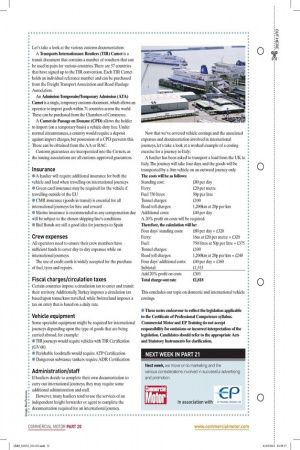Operator CPC Part 20 Welcome to week 20 of our
Page 19

Page 20

If you've noticed an error in this article please click here to report it so we can fix it.
Operator CPC guide in conjunction with EP Training. Collect our articles every week to build up a portfolio to help you with your studies or refresh your knowledge Last week, we looked at vehicle costings and ran through the key formulas you'll need to work out the appropriate costs such as annual standing costs, running costs, vehicle depreciation and charge-out rates.
Revision: Can you remember the differences between a direct cost, an indirect cost, a fixed cost and a variable cost?
This week, we're moving on to costings for an international journey.
Exchange rate issues: One of the financial difficulties a haulier faces when undertaking international journeys is the monetary rate of exchange. Exchange rates between various countries change on a daily basis and the rate difference between quotation and acceptance of a contract can have a significant impact on the level of profitability per job.
When the pound is strong, an operator will receive more foreign currency in exchange for every pound.
If the pound is weak in relation to foreign currency, an operator will receive less for every pound and the costs abroad will be more expensive. Other costs associated with international journeys are as follows: Ferry costs: The amount charged for a ferry crossing will be based upon the length of the journey and overall length of the vehicle.
Road/tunnel tolls: Certain countries impose tolls to use their motorways, bridges and tunnels. The cost of the toll is normally based upon the gross weight of the vehicle along with the number of axles.
Austria, Bulgaria, France, Italy, Norway, Portugal, Serbia and Montenegro, Spain and Turkey impose a toll for using their motorways.
Permits: There are also certain countries that require a road permit to enter or transit their territory. Permits can be purchased from the International Road Freight Office (IRFO). The cost of the permit will depend upon the type that is required.
Customs forms: All movement of goods by road on an international journey are required to be moved under customs control and have a customs guarantee. Let's take a look at the various customs documentation: A Transports Internafionaux Roufiers (TIR) Comet is a transit document that contains a number of vouchers that can be used in pairs for various countries. There are 57 countries that have signed up to the TIR convention. Each TIR Carnet holds an individual reference number and can be purchased from the Freight Transport Association and Road Haulage Association.
An Admission Temporaire/Temporary Admission (ATA) Comet is a single, temporary customs document, which allows an operator to import goods within 71 countries across the world. These can be purchased from the Chambers of Commerce.
A Carnet de Passage en Douane (CPD) allows the holder to import (on a temporary basis) a vehicle duty free. Under normal circumstances, a country would require a deposit against import charges, but possession of a CPD prevents this. These can be obtained from the AA or RAC.
Customs guarantees are incorporated into the Carnets, as the issuing associations are all customs-approved guarantors.
Insurance • A haulier will require additional insurance for both the vehicle and load when travelling on international journeys • Green card insurance may be required for the vehicle if travelling outside of the EU • CMR insurance (goods in transit) is essential for all international journeys for hire and reward • Marine insurance is recommended as any compensation due will be subject to the chosen shipping line's conditions • Bail Bonds are still a good idea for journeys to Spain Crew expenses All operators need to ensure their crew members have sufficient funds to cover day-to-day expenses while on international journeys.
The use of credit cards is widely accepted for the purchase of fuel, tyres and repairs.
Fiscal charges/circulation taxes Certain countries impose a circulation tax to enter and transit their territory. Additionally, Turkey imposes a circulation tax based upon tonne/kms travelled, while Switzerland imposes a tax on entry that is based on a daily rate.
Vehicle equipment Some specialist equipment might be required for international journeys depending upon the type of goods that are being carried abroad, for example: • TIR journeys would require vehicles with TIR Certification (GV 60) • Perishable foodstuffs would require ATP Certification • Dangerous substance tankers require ADR Certification Administration/staff If hauliers decide to complete their own documentation to carry out international journeys, they may require some additional administration and staff.
However, many hauliers tend to use the services of an independent freight forwarder or agent to complete the documentation required for an international journey. Now that we've covered vehicle costings and the associated expenses and documentation involved in international journeys, let's take a look at a worked example of a costing exercise for a journey to Italy: A haulier has been asked to transport a load from the UK to Italy. The journey will take four days and the goods will be transported by a 16m vehicle on an outward journey only. The costs will be as follows: Standing cost: £80 per day Ferry: £20 per metre Fuel 750 litres: 50p per litre Tunnel charges: £100 Road toll charges: 1,200km at 20p per km Additional costs: £40 per day A 20% profit on costs will be required. Therefore, the calculation will be: Four days' standing costs: £80 per day = £320 Ferry: 16m at £20 per metre = £320 Fuel: 750 litres at 50p per litre = £375 Tunnel charges: £100 Road toll charges: 1,200km at 20p per km = £240 Four days' additional costs: £40 per day = £160 Subtotal: £1,515 Add 20% profit on costs £303 Total charge-out rate E1,818 This concludes our topic on domestic and international vehicle costings.
• These notes endeavour to reflect the legislation applicable to the Certificate of Professional Competence syllabus. Commercial Motor and EP Training do not accept responsibility for omissions or incorrect interpretation of the legislation. Candidates should refer to the appropriate Acts and Statutory Instruments for clarification.









































